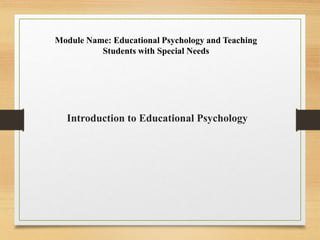
Learning and teaching
- 1. Introduction to Educational Psychology Module Name: Educational Psychology and Teaching Students with Special Needs
- 2. • “Educational psychology is the study of learners, learning and teaching”(Slavin, 2003). • “It is the accumulated knowledge, wisdom, and seat-of-the pants theory that every teacher should possess to intelligently solve the daily problems of teaching”(Slavin, 2003 ). WHAT IS EDUCATIONAL PSYCHOLOGY?
- 3. • Studying how people learn from instruction, and with developing educational materials, programs, and techniques that enhance learning. • And conduct scientific research both to advance theory--such as explaining how people learn, teach, and differ from one anotherand to advance practice--such as determining how to improve learning. • How learning and teaching for people from infancy through old age, in school and outside of school (best known for studying children in school settings) Educational psychology is the branch of psychology concerned with…..
- 4. What makes an Effective teacher?
- 5. Characteristics of an effective teacher Warmth Humor Ability to care Hard work Self- discipline Leadership Enthusiasm Love of learning Knowledge & Skills What makes an Effective teacher?
- 6. HOW DO CHILDREN LEARN? Observation and Imitation: Children learn by observing the behaviors, actions, and language of those around them, especially parents, caregivers, and peers. They often imitate what they see, which helps them acquire new skills and behaviors. Sensory Exploration: Infants and young children learn through their senses by touching, tasting, smelling, hearing, and seeing. These sensory experiences help them understand the world around them. Trial and Error: Children often engage in trial-and-error learning, experimenting with different actions and observing the outcomes. They adjust their behaviors based on the consequences they experience. Cognitive Development: Piaget's theory of cognitive development suggests that children progress through stages of cognitive growth, gradually acquiring more complex mental processes for understanding and problem-solving. Social Interaction: Interacting with peers and adults is crucial for children's learning. Through conversations, discussions, and collaborations, children develop language skills, expand their knowledge, and learn to navigate social situations.
- 7. HOW DO CHILDREN LEARN? Play and Exploration: Play is a significant avenue for learning. Through imaginative play, games, and exploration, children practice decision-making, problem-solving, creativity, and social skills. Schema Building: Children develop mental frameworks called schemas to organize and interpret information. As they encounter new experiences, they assimilate them into existing schemas or create new ones. Zone of Proximal Development (ZPD): According to Vygotsky's theory, the ZPD is the gap between a child's current ability and their potential with guidance. Learning occurs when children work on tasks just beyond their current competence, with the help of a more knowledgeable person.
- 8. HOW DO CHILDREN LEARN? Reinforcement and Rewards: Positive reinforcement, such as praise or rewards, encourages children to repeat desired behaviors or actions. This mechanism strengthens learning pathways in the brain. Critical Thinking: As children grow, they develop critical thinking skills. They learn to analyze situations, make connections, evaluate information, and draw conclusions. Internalization: Through repeated experiences and interactions, children internalize knowledge and skills, transforming external information into internal cognitive structures. Curiosity and Exploration: Children are naturally curious, and their innate curiosity drives them to explore their environment, ask questions, and seek answers.
- 9. HOW DO CHILDREN LEARN? Language Acquisition: Language plays a fundamental role in learning. Children acquire language skills by listening, speaking, reading, and writing, which are essential for communication and accessing knowledge. Self-Regulation: Over time, children learn to regulate their behavior and emotions. This self-regulation is crucial for focusing attention, managing impulses, and adapting to different situations. Emotional Engagement: Positive emotional experiences enhance learning. When children feel safe, motivated, and engaged, their cognitive processes are more receptive to new information.
- 10. • Imagine you are given a task to do. The task is to follow a complicated recipe to produce a Lemon Souffle’ within a time limit. • What might stop you from doing this well? (group work) (individual work) Barriers to success Task 1 • you haven’t got the right ingredients • you can’t understand the metric system • you don’t like lemons • you can’t understand some of the instructions • your oven has a fault • You don’t whip the eggs for long enough • the container is too shallow • you run out of time
- 11. Solution • you haven’t got the right ingredients • you can’t understand the metric system • you don’t like lemons • you can’t understand some of the instructions • your oven has a fault • You don’t whip the eggs for long enough • the container is too shallow • you run out of time
- 12. There are usually several factors which interact to prevent effective learning. What stops children from learning? • Lack of Engagement • External Distractions • Health Issues • Learning Disabilities • Unsupportive Environment • Lack of Resources • Inadequate Instruction • Fear of Failure • Boredom • Language Barriers • Social and Emotional Challenges • Home Responsibilities • Attention Difficulties • Lack of Personalization • Peer Pressure • Lack of Confidence • Excessive Pressure • Trauma
- 13. Interactive Factors in the Learning situation Teacher child task environment
- 14. • the child brings – attitude, abilities, prior learning, etc. • the nature of the task presented • the way the task is taught ( teacher) • the learning environment – arrangement of class, peer group, etc.
- 15. The Principles of Learning and Teaching Let’s say that students learn best when: • The learning environment is supportive and productive (HOW) • The learning environment promotes independence, interdependence and self-motivation (HOW) • Students’ needs, backgrounds, perspectives and interests are reflected in the learning program (HOW) • Students are challenged and supported to develop deep levels of thinking and application (HOW) • Assessment practices are an integral part of teaching and learning (HOW) • Learning connects strongly with communities and practice beyond the classroom (HOW)